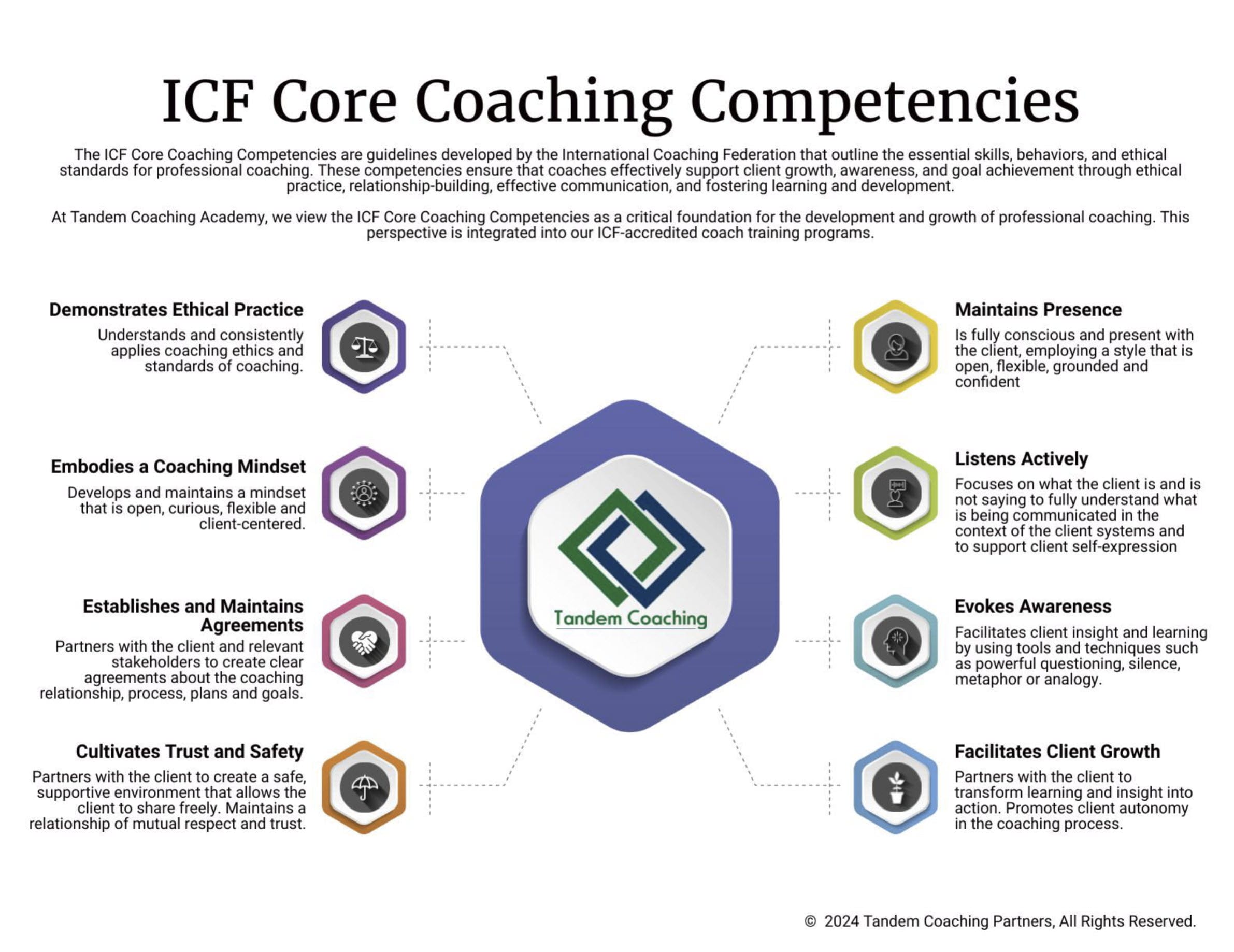The International Coaching Federation (ICF) has recently reached the milestone of 50,000 credential-holders across 140 countries. Only 3.8% of these have reached the MCC (Master Certified Coach) level. We are proud to say that both head coaches at Tandem Coaching are MCC coaches.
Over almost 30 years, ICF has become the organization that sets the standard for coaches worldwide.
Today, we’d like to give you an overview of the ICF Core Competencies! Whether you’re just starting out or looking to enhance your coaching skills, understanding and practicing these competencies will make you a better coach.
The International Coaching Federation (ICF) sets the standard for effective coaching practices, and their core competencies were put in place to make sure coaches provide high-quality sessions that really make a difference in their clients’ lives.
TL;DR – ICF Core Competencies
There are eight ICF Core Competencies. They are:
- Demonstrates Ethical Practice
- Embodies a Coaching Mindset
- Establishes and Maintains Agreements
- Cultivates Trust and Safety
- Maintains Presence
- Listens Actively
- Evokes Awareness
- Facilitates Client Growth
Below, we will go into more detail about what each of them means.
If you are looking to become an ICF-certified coach, we have excellent programs at Tandem Coaching to guide you. Contact us to start your certification journey now and build credibility with your clients.

What Are Coaching Competencies?
Coaching competencies are the essential skills and behaviors that coaches need to practice to effectively guide their clients. These competencies ensure that clients can grow, overcome obstacles, and achieve their goals with the guidance of their coach.
They include a wide range of abilities, from communication and active listening to ethical practice and presence, forming a solid foundation for effective coaching.
What is a Core Competency Coaching Method?
A core competency coaching method refers to the fundamental techniques and approaches that coaches use during their sessions. These are based on the ICF core competencies and are designed to create a structured yet flexible coaching environment.
This involves active listening, powerful questioning, and facilitating client growth through strategic planning and feedback. This approach ensures clients receive personalized coaching that meets their unique needs and goals.

Benefits of ICF Core Competencies
There are several benefits to coaching that are in line with the ICF core competencies.
The main ones are:
Enhanced Professionalism
ICF Core Competencies improve the standard of your coaching by ensuring that you maintain a high level of professionalism. This includes adhering to ethical guidelines and demonstrating a coaching mindset that promotes continuous improvement and client focus.
By upholding these standards, you can build a reputation for reliability and integrity as a coach.
Improved Client Outcomes
You can provide more effective and impactful coaching by consistently applying the ICF Core Competencies. This leads to better outcomes for your clients, as you can tailor your approaches to meet each client’s unique needs to meet their goals.
Clients like a structured approach that guides them toward personal and professional growth in a supportive and effective manner.
Credibility and Trust
As a coach, adhering to the ICF Core Competencies helps build credibility and trust. Clients are more likely to engage with you if you are certified and adhere to recognized standards.
They want to know they will receive quality coaching that aligns with best practices. This credibility is extremely helpful in setting yourself apart and catching clients’ attention in a competitive market.

Coaching Competency Framework
The eight core competencies are divided into four categories that each focus on a different aspect of your coaching practice:
- Foundation: This area covers the basics, such as ethical practice and embodying a coaching mindset. It’s about ensuring you start from a place of integrity and continuous personal growth.
- Co-Creating the Relationship: The focus is on building strong, trust-based relationships with your clients. This includes establishing agreements and creating a safe environment for open dialogue.
- Communicating Effectively: Effective communication is key in coaching. This area emphasizes active listening, being fully present, and engaging in meaningful conversations that help clients gain new insights.
- Cultivating Learning and Growth: This section is about helping clients grow and achieve their goals. It involves encouraging self-reflection, challenging assumptions, and supporting clients in their personal and professional development.
By understanding and applying these four areas, you can develop a well-rounded coaching practice that meets the ICF standards.
List of ICF Core Competencies
The four areas discussed above include specific competencies you’ll develop through ICF coaching.
Let’s have a look at the 8 Core Competencies in more detail:
1. Demonstrates Ethical Practice
To work professionally as a coach, you must understand and apply coaching ethics. You’ll need to maintain personal integrity and honesty in all your interactions. This means respecting your clients’ identity, environment, experiences, values, and beliefs. Using appropriate and respectful language is also part of that.
You must abide by the ICF Code of Ethics. Always maintain confidentiality and be very clear on the distinctions between coaching, consulting, psychotherapy, and other support professions. When necessary, refer clients to other professionals to keep your practice ethical.
2. Embodies a Coaching Mindset
As a coach, you need to have a growth-oriented and flexible coaching mindset. Recognize that clients are responsible for their own choices and encourage their autonomy.
For your own skill development, be sure to engage in ongoing learning and reflective practices. Stay aware of context and culture’s influence on yourself and your clients.
Use your self-awareness and intuition to benefit your clients by regulating your emotions to stay present and effective. Don’t shy away from seeking help from outside sources when needed. Even an experienced coach needs coaching at times.
3. Establishes and Maintains Agreements
Effective coaching begins with clear session agreements. You’ll partner with clients and stakeholders to define the coaching relationship, process, plans, and goals. This involves explaining what coaching is and is not and reaching agreements on logistics, fees, scheduling, and confidentiality.
Then, you’ll work with your client to create a coaching plan, set session goals, and establish measures of success. That way, you can ensure compatibility and manage the time and focus of sessions more effectively.
When the time comes to end the coaching relationship, do it respectfully and acknowledge the progress the client has made.
4. Cultivates Trust and Safety
To build a productive coaching relationship, you must create a safe, supportive environment. Understand your clients within their context and show respect for their identity, perceptions, and style.
Then, adapt your coaching approach to fit their needs. Demonstrate support, empathy, and concern, acknowledging their feelings and suggestions. Being open and transparent builds trust and encourages clients to engage fully in the coaching process.
5. Maintains Presence
Developing your coaching presence means staying focused, observant, empathetic, and responsive during sessions. Show curiosity and manage your emotions to remain engaged with your client. Build your confidence in handling strong emotions.
Be comfortable with not knowing all the answers and allow space for silence and reflection. This presence helps you provide effective support and guidance tailored to your client’s needs.
6. Listens Actively
Active listening is about understanding your client deeply. Pay attention to their context, identity, environment, experiences, values, and beliefs. Reflect and summarize their communication to ensure clarity.
Recognize when there’s more to their message and inquire further. Notice and explore their emotions, energy shifts, and non-verbal cues. Integrate their words, tone, and body language to grasp the full meaning. Identifying patterns in their behavior and emotions helps in understanding their journey.
7. Evokes Awareness
Helping clients gain insights involves powerful questioning, silence, metaphors, or analogies. Consider their experience to decide on the best tools. Challenge them to evoke awareness and insight, asking questions about their thinking, values, needs, wants, and beliefs.
Encourage them to explore beyond current thinking and share their experiences. Notice what works to enhance progress and adjust your approach accordingly. Help them identify factors influencing their behavior and generate ideas for moving forward. Support them in reframing perspectives and sharing observations to create new learning.
8. Facilitates Client Growth
Your role is to help clients transform learning into action. Work with them to integrate new awareness into their worldview and behaviors.
Design goals, actions, and accountability measures that expand on new learning. Acknowledge and support their autonomy in setting goals and methods of accountability.
Help them identify potential results or learn from their actions. Summarize learning and insights within or between sessions, celebrating their progress and successes.
End the coaching relationship respectfully to honor the client’s experience and growth.
Connect with us to start your certification journey now and build credibility with your clients.

Frequently Asked Questions (FAQs)
Here are some frequently asked questions about the ICF core competencies:
What Are the ICF Core Values?
The ICF Core Values are professionalism, collaboration, humanity, and equity. These values guide all ICF professionals, i.e., everyone who works under the ICF banner.
The ICF has also defined a set of core competencies to guide the behavior of coaches who are certified by the ICF.
How Do ICF Core Competencies Influence Coaching Practices?
The ICF (International Coaching Federation) Core Competencies provide a framework for effective coaching practices.
They ensure coaches follow ethical standards, employ effective techniques, and actively support client growth, leading to more impactful coaching outcomes. By following these competencies, coaches can deliver consistent and reliable coaching services.
How Can Coaches Develop ICF Core Competencies?
Coaches can develop ICF Core Competencies through accredited training programs, continuous professional development, and practical coaching experience. Engaging in mentorship and supervision also supports competency development. These opportunities help coaches to refine their skills and stay current with best practices.
Find out more about how Tandem Coaching can support you in developing the ICF Core Competencies. Contact us now.
Are There Training Programs Focused on ICF Core Competencies?
Any training programs accredited by the ICF are designed to develop the core competencies. These programs provide comprehensive training, practical experience, and mentorship to help coaches master these essential skills.
Our accredited programs here at Tandem Coaching include the ACC certification and PCC certification programs, both of which teach the core competencies.
How Are ICF Core Competencies Assessed During Certification?
ICF Core Competencies are assessed through a combination of training, coaching experience, and performance evaluation. Coaches must demonstrate their ability to apply these competencies in real coaching scenarios through recorded coaching sessions and examinations.
This assessment process ensures that certified coaches not only know the core competencies in theory but can also apply them in practice.
Conclusion
Understanding and mastering the ICF Core Competencies is essential for any coach looking to deliver high-quality, impactful coaching. These competencies provide a solid foundation for professional development, client satisfaction, and career growth.
Whether you’re just starting your coaching journey or looking to enhance your skills, focusing on these core competencies will help you achieve your goals and make a lasting impact on your clients.
Contact us to start your certification journey now, build up your core competencies, and further your coaching career.
Read Other Posts of the New ICF Core Competencies Series

Unlock Your Coaching Potential with Tandem!
Dive into the essence of effective coaching with our exclusive brochure, meticulously crafted to help you master the ICF Core Coaching Competencies.
"*" indicates required fields
About the Author
Cherie Silas, MCC
She has over 20 years of experience as a corporate leader and uses that background to partner with business executives and their leadership teams to identify and solve their most challenging people, process, and business problems in measurable ways.















